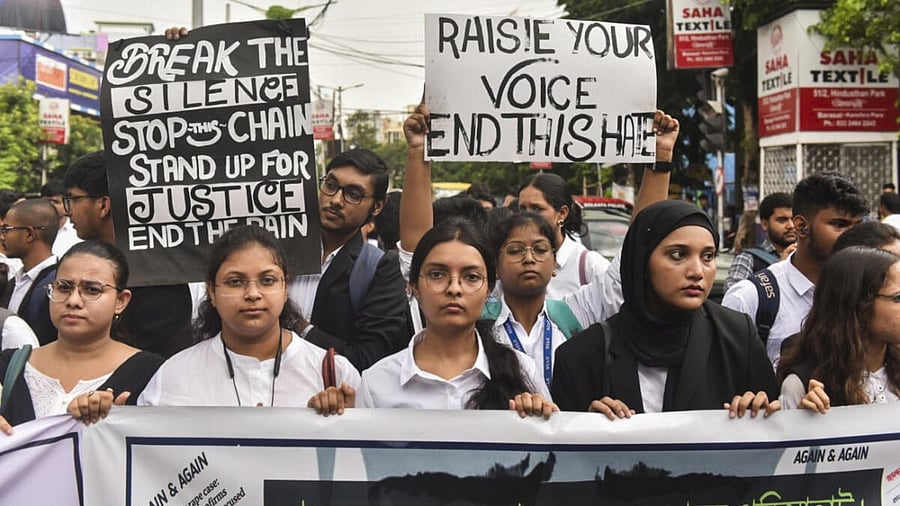
Law students take part in a protest rally against the alleged rape of a student at a law college, in Kolkata, Tuesday, July 1, 2025.
Credit: PTI Photo
Kolkata is again in the news for the gang rape of a student, and the many versions and responses emerging in its wake. A 24-year-old law student was allegedly raped at South Calcutta Law College, less than a year after the rape and murder of a trainee doctor at the city’s RG Kar Medical College. There are four accused —a college alumni and staffer, two current students, and a security guard. The main accused has a criminal record with multiple charges and he once led the Trinamool Chhatra Parishad unit at the same college where he studied. He has a history of harassment and molestation of women and may have been emboldened by his political links. He held a contractual non-teaching position in the college.
All the four accused have been arrested and a Special Investigation Team (SIT) is investigating the incident. But the narrative has been taken over by political parties. Opposition parties have pointed to the affiliation of three of the four accused to the Trinamool Chhatra Parishad, the student wing of the ruling Trinamool Congress. The BJP has formed a “fact-finding” committee to probe the lapses of the government. The TMC government has promised “exemplary punishment” to the culprits, but its own functionaries have made objectionable and misogynistic remarks in connection with the incident. Two leaders of the party sought to blame the victim, reflecting the usual patriarchal justification for crimes against women. Their responses only bring disrepute to a party which claims to have the largest number of women members among all parties in India, and runs a government headed by a woman.
Crimes against women are not just individual crimes, but also also systemic ones. The fact that women are being targeted in public spaces traditionally considered ‘safe’—educational institutions and hospitals—is proof of that. Last year’s incident in Kolkata and the Abhaya rape occurred in public spaces. Though there are strict laws against rape and other crimes against women, some of which invite the death penalty, criminals are not deterred. The crimes are also sought to be politicised. The recurring crimes in Kolkata have blotted the fair name of the city, which once prided itself on being the safest in India for women. One party which blames another for crimes against women finds itself in the dock in another state. Politics played around crimes against women only makes the law and order failure worse. When women are unsafe in public spaces, the government cannot escape responsibility.
